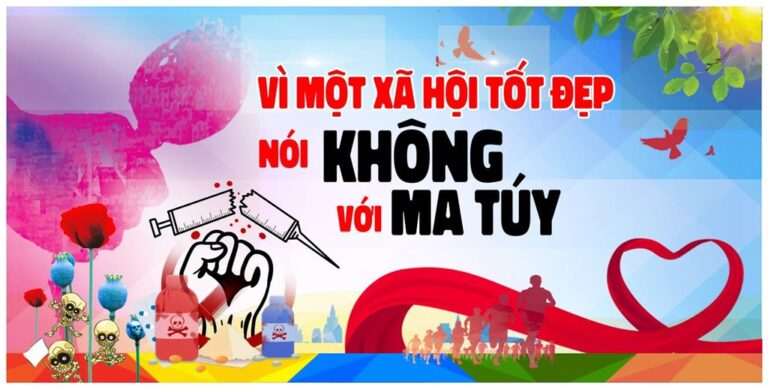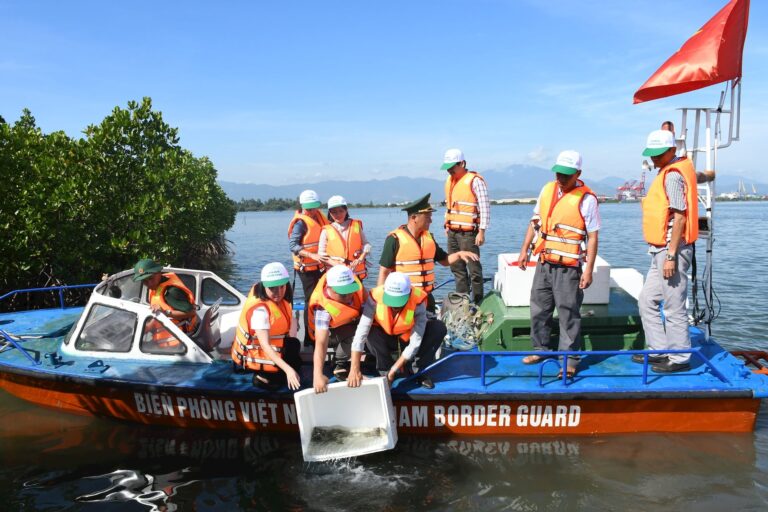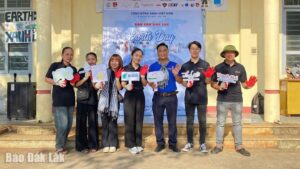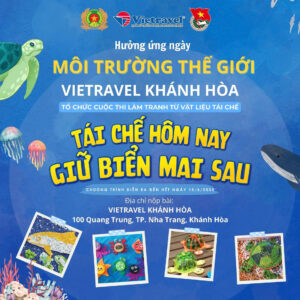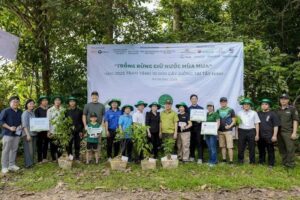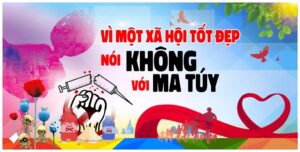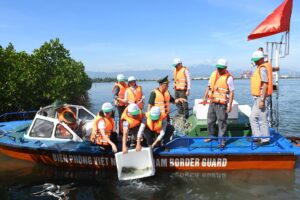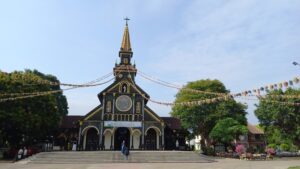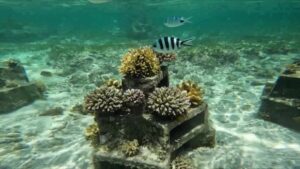In the Mekong Delta, there's a common saying: "Wild birds and fish - catch them, eat them," suggesting that whoever catches wild birds and fish from nature can use them as they please.
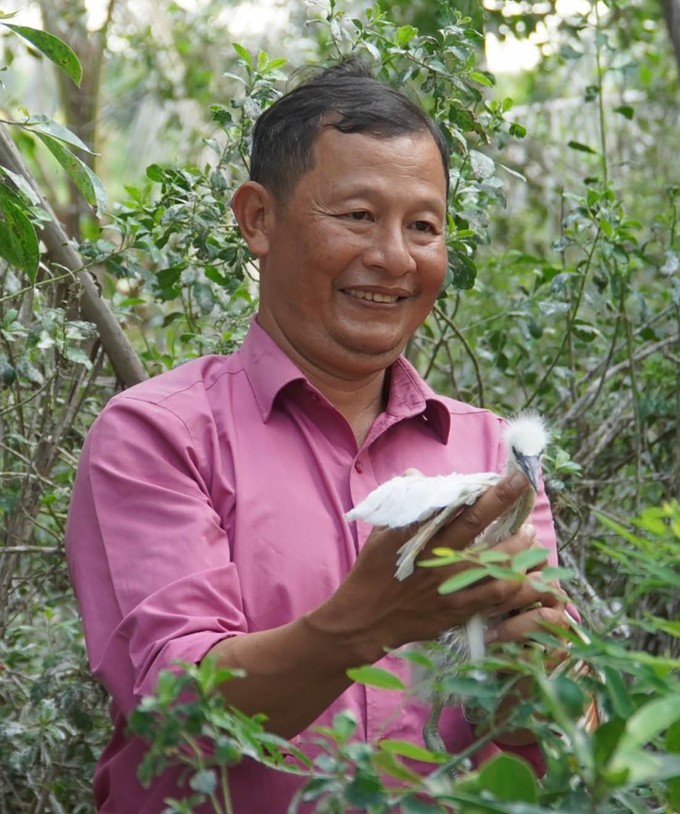
Danh Tinh willingly dedicates his coconut plantation for the storks' habitat.
However, some residents here see taking care of these "wild birds and fish" as a joy and a responsibility. Over time, in the Mekong Delta, the connection between humans and nature has been clearly demonstrated through accidental but deeply intertwined relationships.
Home of thousands of birds and storks
In Dong Thanh Commune, An Minh District, Kien Giang Province, people can easily give directions to the stork garden of Danh Tinh and his wife. Although it is not the only coconut plantation in the area, birds and storks have chosen Tinh’s land as their refuge. From afar, people can easily hear the storks calling to each other, their white feathers blanketing the sky.
According to Tinh, in 2014, his family started planting coconut trees on about 1 hectare of land. About two years later, the storks began to come to the garden to sleep overnight and then fly away to seek food in the early morning. When the coconut garden was five years old and began to bear fruit, more and more storks flocked to it.
“At that time, I jokingly said that if they wanted to stay, I would let them have the coconut plantation. Unexpectedly, just a month later, thousands of storks came to settle and nest. Feeling compassion for them, my wife and I decided to dedicate the land for the storks to live,” Tinh shared.
Storks and great cormorants flock to live, nest and continuously multiply in the coconut plantation. Currently, Tinh's coconut plantation hosts over 10,000 birds, including storks, great cormorants, and grey-headed swamphen. During the day, the birds go out to forage and return around 3-4 p.m., perching densely on the coconut trees.
Many storks that return late have no place to perch and must sleep on the ground. Additionally, there are hundreds of bird nests in the coconut trees. The sight of mother storks feeding their young and flocks of storks filling the sky as they search for landing spots delights many visitors who come to see the stork garden.
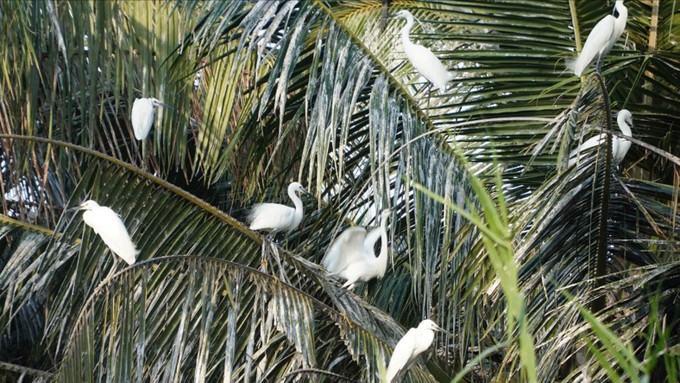
To provide more habitat for the birds, Danh Tinh recently decided to plant more coconut trees, expanding the garden to 2.5 hectares. "Many people told me I was crazy for giving up land for birds instead of using it to grow coconuts for profit. But my wife and I think differently. Since the storks have come to live here, we have felt closer to nature, happier, and more content," Tinh shared.
Nguyen Thi My Xuan, Tinh’s wife, shared that they are committed to preserving the stork garden so that locals and tourists visiting An Minh District have an interesting place to visit. To prevent poachers and vandals from harming the stork garden, the couple constantly monitors and guards it.
Once, when they caught a group setting traps and shooting at the storks, Tinh asked the police to pardon them and invited them to share a meal with his family in the coconut garden, hoping to persuade and educate them. As a result, the storks have felt safe and have continued to thrive and multiply.
“If we are fortunate enough, my husband and I hope to maintain and bond with the storks until our last breath. The storks have now become close companions to our family,” Xuan revealed.
River Fish Protection Task Force
Recently, curious residents have been gathering along the river near An Binh Temple in Hong Ngu City, Dong Thap Province, to watch thousands of river fish congregating there. The array of species includes Java barb, pangasius fish, and carp, delighting the locals. While attracting river fish is common in the Mekong Delta, the establishment of an entire "task force" dedicated to protecting these river fish, as seen in Hong Ngu City, is a rare and commendable effort.
Inspired by the idea of conserving and nurturing river fish, and revitalizing natural aquatic resources, Mr. Truong Minh Hai, team leader, along with about a dozen locals, formed the "River Fish Protection Task Force".
To kick off their efforts, the task force creates habitats for fish over 2,000 square meters in the river. Additionally, to deter illegal fishing activities, they set up bamboo fences and maintained a regular presence to safeguard the river fish.
"The thriving fish population will enrich the river's aquatic resources. This initiative represents our commitment to sustainable fisheries protection. We are resolute in preventing harm to the fish from malicious actors, ensuring that they flourish throughout the region," Hai explained.
Tran Kim Phi, a resident of Hong Ngu City, enthusiastically brought a bag of fish to release in the area managed by the River Fish Protection Task Force. "Previously, I hesitated to release fish into the river due to the risk of illegal electric fishing. Now, I am delighted to release fish here knowing they are protected and well cared for," Phi shared.
The protected river stretch, from Nguyen Tat Thanh Bridge to So Thuong Bridge spanning 3 kilometers, has been off-limits for fishing under the Hong Ngu City People's Committee regulations for the past two years. With the motto "Small rain lays great dust," the river fish protection team has been organizing meetings with numerous locals to spread awareness and provide advice. As a result, the practice of destructive fishing has steadily declined.
Secretary Le Ha Luan of Hong Ngu City Party Committee announced that the city aims to develop the river section into a community tourism hotspot. Shortly, visitors to the Pangasius capital of Hong Ngu City will have the opportunity to observe river fish, feed them, and participate in releasing fish in the protected river area.
"The district plans to expand the protected river fish area, integrating conservation efforts. This initiative not only aims to educate and raise awareness about preserving aquatic resources but also aims to provide local residents with additional income through the sale of food and related services," Luan shared.
By Thanh Nhon - Translated by Thuy Doan


